Give Back Ghana Tree Planting for Emancipation Day
As part of Emancipation Day celebrations and the Give Back Ghana program for Beyond the Return, a team from Ghana Tourism Authority and the Beyond the Return Secretariat participated in a tree planting activity in Assin Praso in Ghana’s Central Region. Over 100 trees were planted along the path that leads to a historical site where captured enslaved Africans were taken hundreds of years ago in the height of the slave trade era. The contestants from Ghana’s Most Beautiful Pageant also joined in the day’s activities each planting a tree of her own.
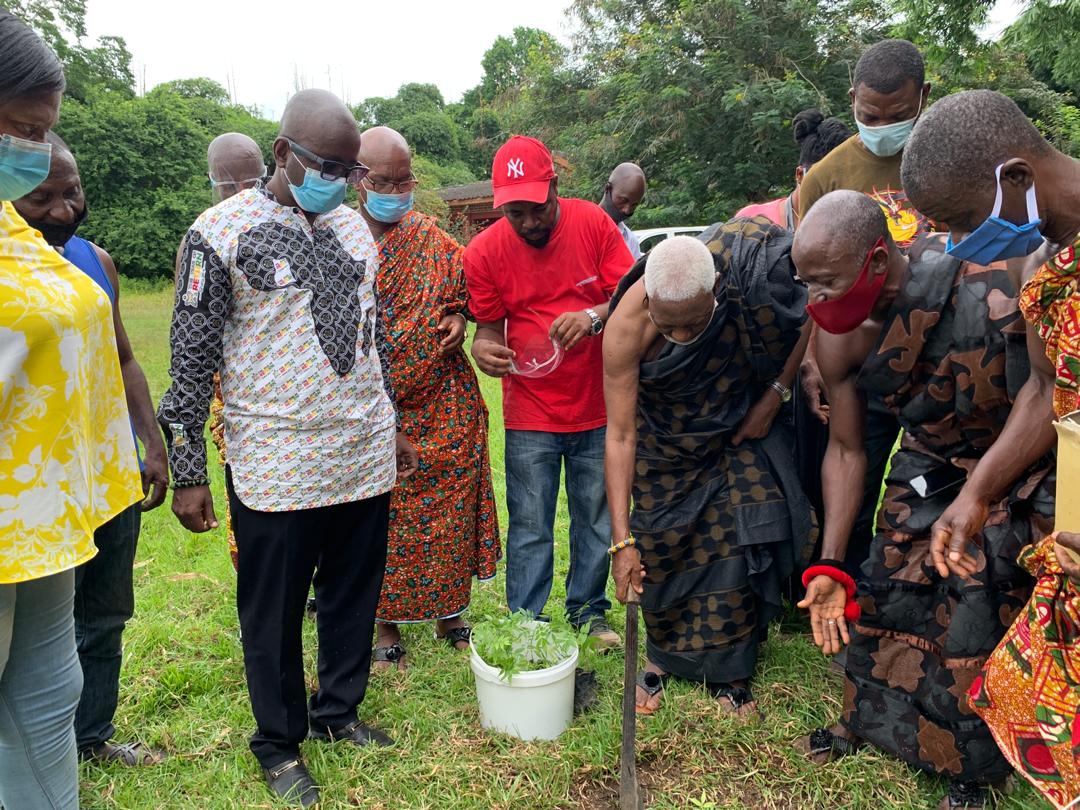
This important exercise is being done across the country with trees being planted in all of Ghana’s 16 regions. This is a way to give back to our environment and to also to build a better Ghana. It also serves as a symbolic gesture for future generations to see the trees we planted today. Manager of Beyond the Return, Annabelle McKenzie and Marketing Manager for Ghana Tourism Authority, Roberta Dawson-Amoah both participated in planting their own trees to help give back to and preserve Ghana’s environment.
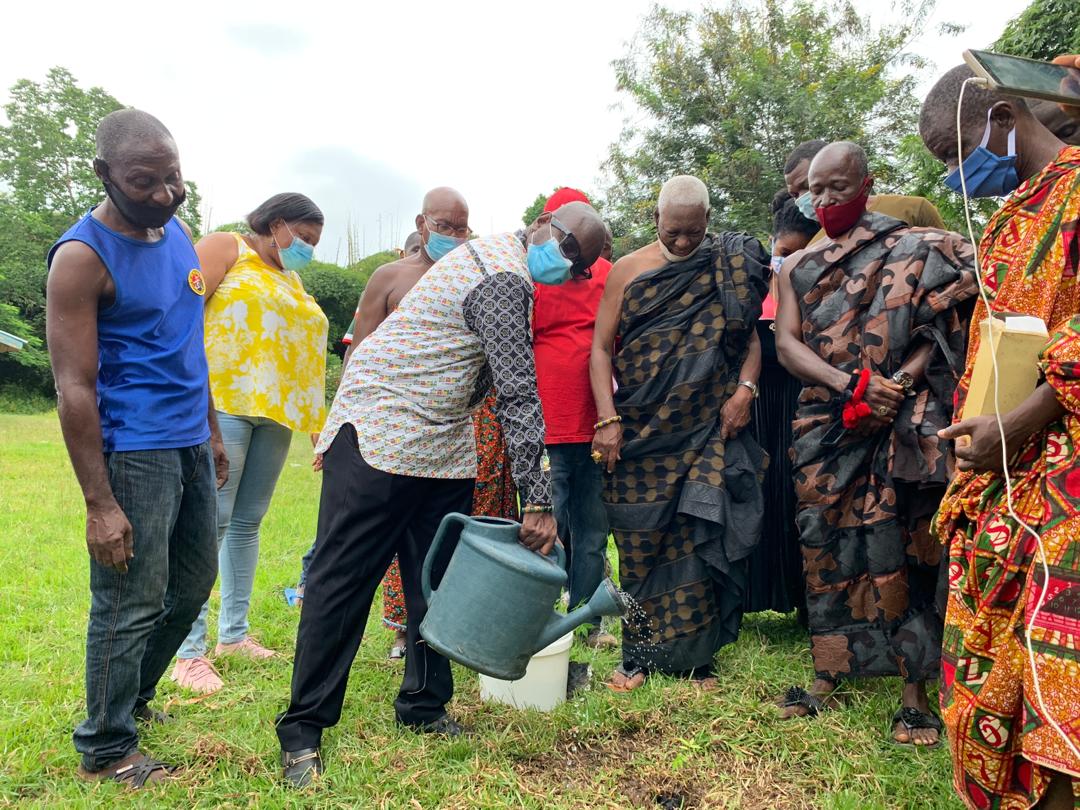
CEO of Ghana Tourism Authority, Akwasi Agyeman, welcomed everyone to the site. He said that every year Ghana celebrates the resilience of the African and the end to chattel slavery through its celebrations of Emancipation Day. He said that this year because of the circumstances we are in, due to the pandemic we are unable to do what normally takes place, which is the re-enactment of captured Africans crossing of the river during the time of slavery. “Beyond that story of what happened here during the slave trade, there are also two significant incidents,” Mr. Agyeman said. “The Yaa Asantewaa War against British colonialism and the Anglo – Asante War. Today we are going to plant trees as our way of celebrating emancipation so that future generations will come and see these trees planted as a symbol of what happened in 2020 when we couldn’t celebrate the way we normally do.”
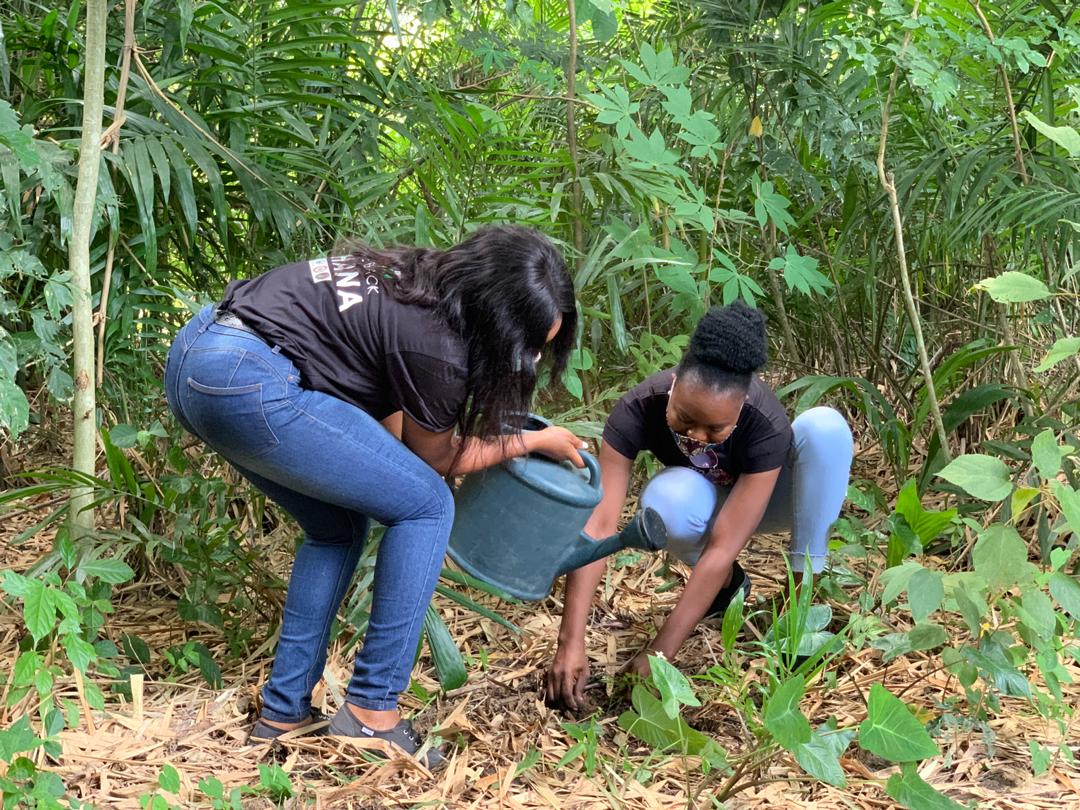
Over 100 trees were planted in Assin Praso along the path that leads to the historical site where the captured enslaved Africans were buried in mass graves. The contestants from Ghana’s Most Beautiful pageant listened attentively as they learned the history of the grounds that they were planting trees on. Like some Ghanaians, they were learning this history for the first time.
Divisional Chief of Assin Jakai-Assin Praso, Nana Owodo Aseku X, spoke to everyone and recounted the history of Assin Praso along with the significance of the site which is now a popular tourist attraction. He was also joined by other elders in the community including Nana Baffour Adjei X, and Nana Yaw Owusu Aduemi, as they shared stories of history in their community.
Assin Praso was one of the busiest tourist sites last year during the Year of Return. Many people from the diaspora came to see the grounds where Africans were buried in mass graves and the river that was crossed during that time.
Congressman John Robert Lewis Honoured by Diaspora African Forum
Rep. John Robert Lewis, was a civil rights icon who worked alongside some of the greatest black leaders in history. He spent a lifetime in the fight for equality for black people in America having worked alongside Rev. Dr. Martin Luther King Jr. and countless others. In 2011, he was given the Presidential Medal of Freedom, by President Barack Obama. Sadly, he died on July 17, 2020 due to complications with pancreatic cancer.
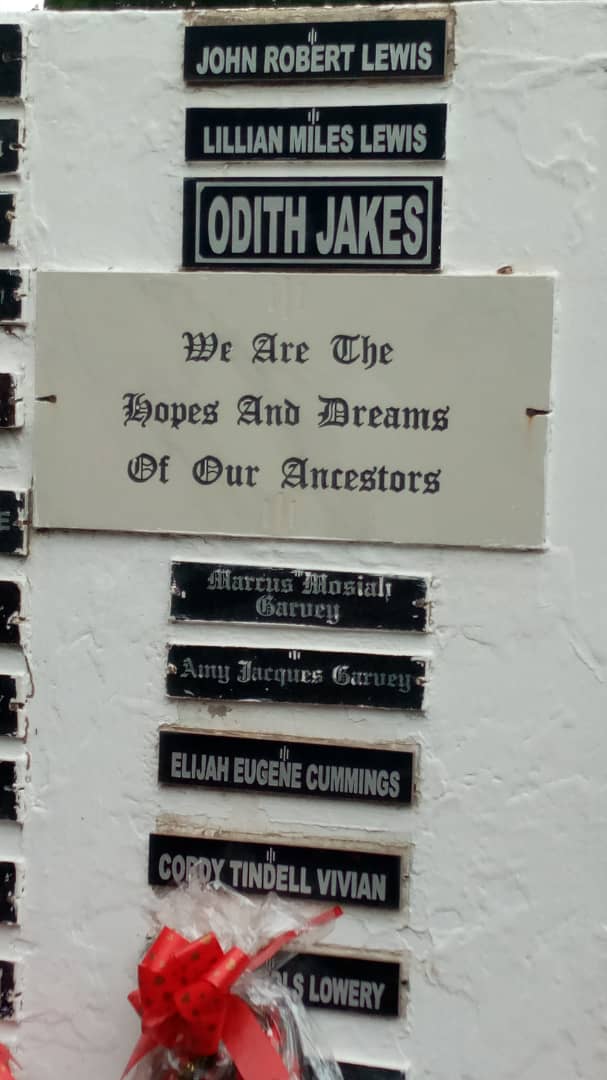
As part of a wreath-laying ceremony that honoured Pan African leaders in on July 27th, the Diaspora African Forum unveiled the name of Rep. John Robert Lewis on the Sankofa Wall located at their headquarters behind the W.E.B. Dubois Centre in Accra. The Diaspora African Forum is supported by the African Union and its Head of Mission is H.E. Ambassador Erieka Bennett. Their vision is to bridge the gap between the African diaspora and Africa. They are consistently dedicated to recognizing people who have made significant contributions to the advancement of people of African descent around the world.
The addition of John Robert Lewis’ name to the wall, is important because it reminds us of how united we are in the fight for our freedoms as people of African descent. Those in attendance of the ceremony included, the Minister of Tourism Arts & Culture, Barbara Oteng-Gyasi, CEO of Ghana Tourism Authority, Akwasi Agyeman, Director of Diaspora Affairs, Akwasi Ababio, Executive Director of PANAFEST, Rabbi Kohain, and Director of the Kwame Nkrumah Memorial Park, Alhaji Abubakari Issah Osman.
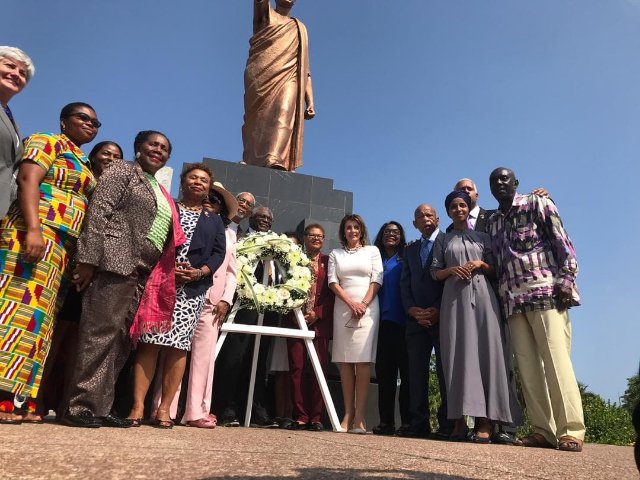
Last year, Lewis visited Ghana with the Congressional Black Caucus and Speaker Nancy Pelosi. It was a historical trip as they participated in the Year of Return by commemorating the 400-year anniversary of the first documented ship of enslaved Africans who arrived in the English colony that is now the United States. In commemorating the year, it was also an opportunity to celebrate the resilience of the African spirit. He paid a visit to the dungeons at both the Cape Coast and Elmina Castle which was significant because that is where millions of captured Africans were transported through during the slave trade era.
The name, John Robert Lewis, will live forever on the Sankofa Wall in Ghana. A symbolic return to the motherland and a testament and representative of the ancestors who never imagined one of their descendants would ever return home.
By: Ivy Prosper
Emancipation 2020 Wreath-Laying Ceremony Honours Pan African Leaders
Three leaders in the Pan African movement, W.E.B. DuBois, George Padmore and Kwame Nkrumah, were honoured in a wreath laying ceremony on July 27th, 2020. This marked the beginning of activities that lead up to the annual celebration of Emancipation Day on August 1st. This year’s theme for Emancipation is, “Our Heritage, Our Strength, with a sub-theme: ‘Leveraging our Strengths; Black Lives Matter’.
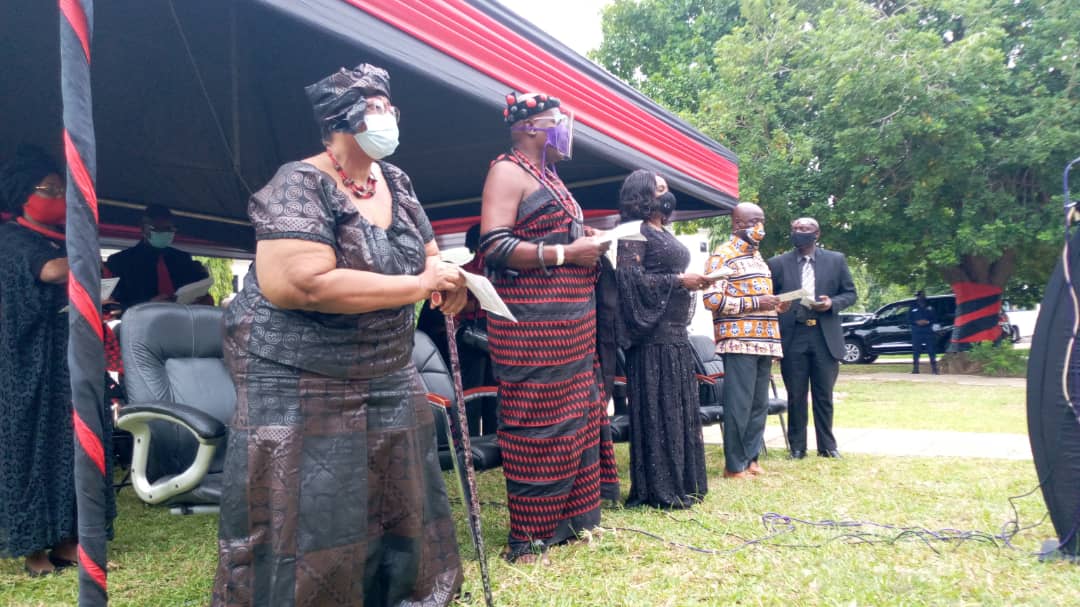
The ceremonies took place at the W.E.B DuBois Centre, George Padmore Library and at the Kwame Nkrumah Memorial Park. Each of these leaders were honoured with a small ceremony at their respective place they have been laid to rest. Notable people present at the ceremonies included the Minister of Tourism Arts & Culture, Barbara Oteng-Gyasi, CEO of Ghana Tourism Authority, Akwasi Agyeman, Director of Diaspora Affairs, Office of the President, Akwasi Awuah Ababio, Chairperson of PANAFEST Foundation, Professor Esi Sutherland-Addy, Head of Missions at Diaspora African Forum, Ambassador Erieka Bennett, Executive Director of PANAFEST Foundation, Rabbi Halevi Kohain, and Author Lala London from Saint Vincent & Grenadines.

Hon. Oteng-Gyasi delivered a heartfelt message during her keynote address at the DuBois centre and welcomed the youth and students who also joined in the event. The minister said that the writings of DuBois and his political philosophies challenged the notion that the black man was inferior. She said that it was no surprise that former President Nkrumah found a kindred spirit in DuBois and that his relocation to Ghana was a clear demonstration of his Pan African beliefs. “The call for African unity championed by Dr. Kwame Nkrumah is as relevant today as it was in the early days of independence,” the minister said.
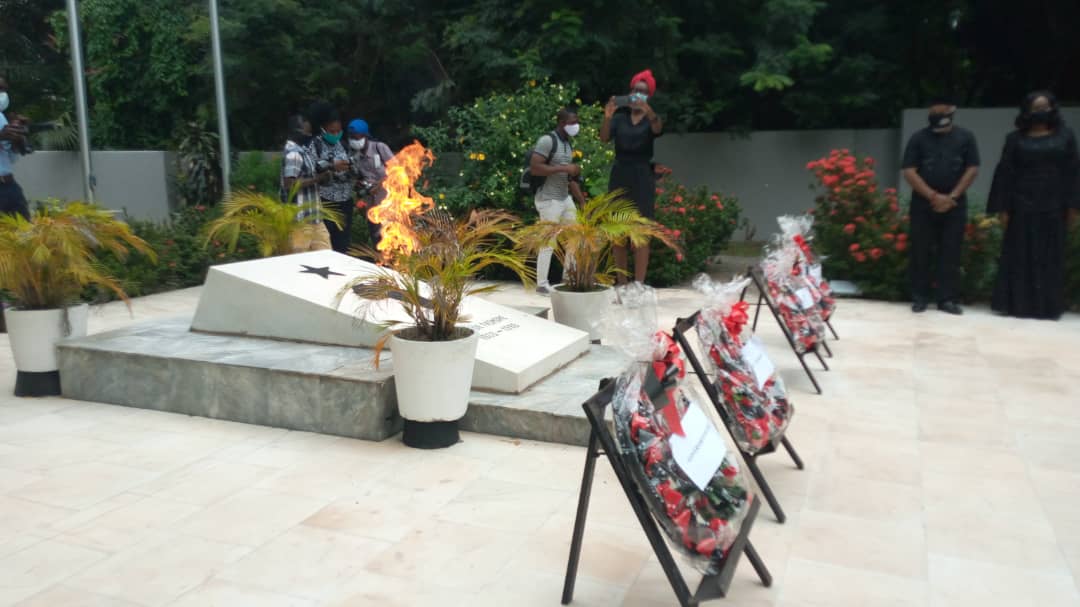
Four wreaths were laid at each location to honour the three men: from the government of Ghana, traditional authorities, the global African family and the youth of Africa. Due to covid-19 measures in place, the number of attendees at each ceremony was limited and strict measures were adhered to when the wreaths were laid.

After the ceremony at the Dubois centre, a plaque honouring the late civil rights icon, John Robert Lewis was unveiled on the Sankofa Wall at the Diaspora African Forum. Ambassador Bennett said that, “John Robert Lewis dedicated his life to the emancipation of black people around the world.” The memorial wall has the names of people who have made an impact in the movement for black people on the continent and in the diaspora. Bennett said that Lewis kept the spirit of Dr. Martin Luther King Jr. alive. It was important to honour him. The name of civil rights advocate, Congressman Elijah Cummings, who died last year was also added to the wall.
Prof. Sutherland-Addy spoke to how significant last year was during the Year of Return when people had travelled from all over the world and what a stark difference the energy was this year as the pandemic has limited our interactions. She highlighted how the current climate of racial tensions have forced us to look at the systemic issues affecting black people around the world. She said that during these times we must question the systems and do the things necessary to make us the owners of our own destiny.
Ghana Gurus Ghana e-Learning Platform Launched by Ghana Tourism Authority
Ghana Gurus Tourism e-Learning Platform Launched by Ghana Tourism Authority
A new digital platform offers people from around the world the opportunity to learn about Ghana’s tourism industry. The Ghana Guru Tourism e-Learning Platform is an interactive tool designed to help you gain knowledge about Ghana and equip you with the skills needed to successfully promote the country’s tourism potential. Hon. Barbara Oteng-Gyasi, Minister of Tourism Arts & Culture, spoke at the official media launch for the website on July 22nd at the Accra Tourist Information Centre. She said the platform will help Ghana to gain and sustain interest in the country as a destination place especially as we have shifted towards more digital resources during the pandemic.
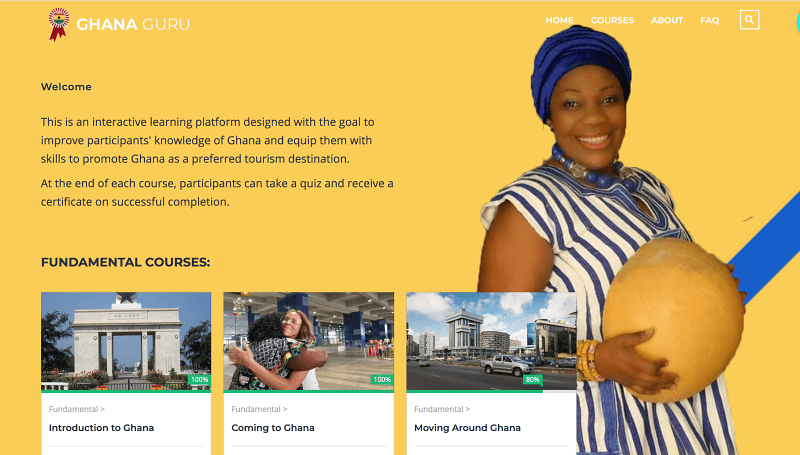
The new website can be found at www.ghanagurus.com and offers seven courses of learning where participants are awarded a certificate after completion of all sections. Director in Charge of product development at Ghana Tourism Authority, Ben Anane Nsiah, took the time to do a demonstration and go through basics of the website during the media launch. There are seven courses covered which include, Introduction to Ghana, Coming to Ghana, Moving Around Ghana, Culture & Regional Background, Ecotourism & Adventure, Heritage and Meeting in Ghana. The simple website is easy to navigate and promises to help participants become more knowledgeable about Ghana and gain the expertise to promote the country as a tourism destination.
The courses are free and give one the ability to brand themselves as an expert in Ghana tourism. The certificate received at the end is recognized by the Ghana Tourism authority making those who have completed the courses a ‘Ghana Guru’. The new platform will also serve as a good resource for tour guides, tour operators and other stakeholders in the industry to update their knowledge of Ghana. The tourism sector is leading the way through the launch of this digital platform which is the result of adapting to the current times.
Among those present at the launch were Akwasi Agyeman, CEO of Ghana Tourism Authority, Emmanuel Frimpong, from Ghana Tourism Federation, Alhaji Abubakari Issah Osman, Executive Director of Kwame Nkrumah Memorial Park and Annabelle McKenzie, Manager for the Beyond the Return Secretariat. Hon. Oteng-Gyasi, declared the Ghana Guru Tourism e-Learning Platform, officially launched.
By: Ivy Prosper
2020 Emancipation Celebration Launched
Ghana Tourism Authority (GTA) in collaboration with the Graphic Communications Group Limited (GCGL) have launched the Emancipation Day celebrations and “Do Ghana” Travel Festival at the Accra Tourism Information Centre (ATIC) in Accra to kick-start activities lined up for this year’s programme.
The celebration, on the theme: “Our Heritage, Our Strength, with a sub-theme: ‘Leveraging Our Resilience; Black Lives Matter” is aimed at rekindling the frame of unity among black people everywhere and highlighting the interconnected nature of their struggles here on the mother continent and in Europe and America.
Why you should join the Emancipation celebration
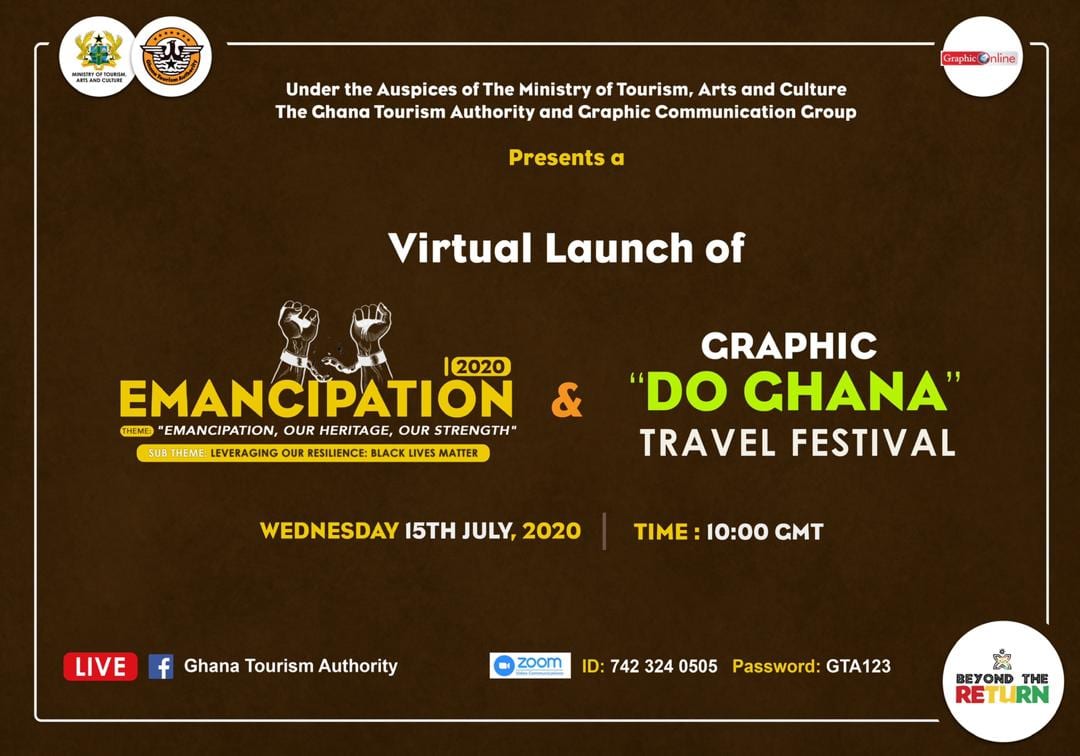
Hon. Dr. Ziblim Iddi Barri, Deputy Minister of Tourism Culture and Creative Arts said the event is designed to help Africans to reconnect their strengths and rededicate themselves to fully assume their own destiny in recognition of the lessons of history.
He said, “Emancipation Day should remind us once again that, the African family has been separated and that the different factions of the family both on the mother continent and in the Diaspora have suffered from this brutal and traumatic separation.”
“The persistent police brutalities and the criminalization of the judicial system against African American males and the recent killing of George Floyd, an African American, all point to an enduring, pervasive and bigoted world view fuelled by feelings of racial superiority among sections of the Caucasian population,” he added.
Year Of Return: Wreath-Laying ceremony held at historic sites to commemorate 2019 PANAFEST / Emancipation
On his part, the Chief Executive Officer of GTA, Mr. Akwasi Agyeman, said “the celebration would open to see domestic arrivals performing insight from various industries and interact with each other in a meaningful way.”
Emancipation Day Celebration is a national and annual event observed to commemorate the resistance and liberation of African people in the Diaspora against enslavement and violation of their human rights.
Activities
| Date | Activity | Location |
| 27/07/2020 | Wreath-Laying | Accra |
| 28/07/2020 | Panel Discussions | Virtual |
| 30/07/2020 | Tree Planting | All Regions and Assin Manso |
| 31/07/2020 | Reverential Night | Cape Coast |
| 01/08/2020 | Emancipation Day Ceremony / Healing Prayers | Assin Manso |
The Emancipation Day Celebration which originated in the Caribbean has been celebrated since 1834 when chattel slavery was finally abolished in the Caribbean.
The event has been on Ghana’s tourism calendar of events since 1998. Ghana became the first African Country to re-affirm its status as the gateway to the homeland of Africans in the Diaspora.
Emancipation Day more consciously serves to create and develop a unique sense of unity, cooperation, and understanding amongst Africans the world over as well as all people of conscience. Emancipation is not only freedom to the enslaved, but also the enslaver.
Source: Happy Fm
Panafest 2021 Officially Launched With A Virtual Event
Nearly 100 people joined the Virtual Launch for PANAFEST 2021 on a Zoom Conference led by Rabbi Kohian, Executive Director for PANAFEST Foundation and Professor Esi Sutherland-Addy, Chairperson for the PANAFEST Foundation. The festival was officially launched and is set to take place 23rd July – 3rd August 2021 under the theme, ‘Securing the African Family, Our Soul, Our Health, Our Wealth.’ Details for the full program of events have yet to be confirmed, but the Grand Durbar, which serves as a major event that brings together the representation of Chiefs and Queen Mothers will continue to be in the program. Sutherland-Addy says, “The Grand Durbar has a Pan African tone to it, making it different from other durbars,” thus it will remain a key part of the celebration.
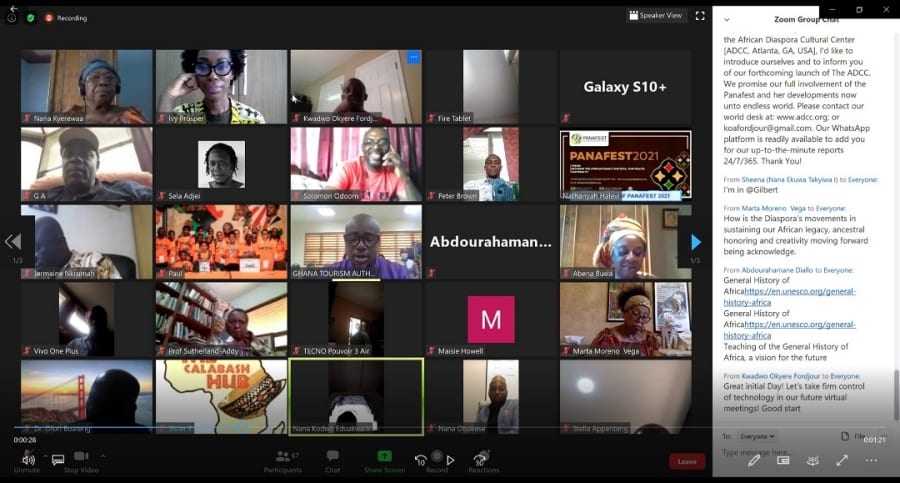
Guests who joined the virtual launch came from all over the world including the U.K., United States, Puerto Rico and Ghana. Kohain greeted all attendees saying that the coronavirus has put us into this virtual situation. Because of social distancing measures and border closures, it was necessary to make this a virtual launch.
The Paramount Chief of Cape Coast, Osabarimba Kwesi Atta II, was the first speaker Rabbi Kohain introduced to address everyone on the virtual call. “Today is a remarkable day for us to launch PANAFEST 2021,” he said. “…because the African is being marginalized in the minds of other people, that’s why we are calling on all Africans, wherever they find themselves, to take part in next year’s PANAFEST celebrations…Let us tell the whole world that Africans matter and for that matter….the black man matters.”
Professor Esi Sutherland-Addy thanked everyone for joining the call before she began to deliver her welcoming statement. ”Last year the African family came together in large numbers to participate in ceremonies, rites performances and conferences, which PANAFEST has become known for…Certainly, the context of the commemoration of the infamous milestone of the 400 year anniversary of the documented arrival of Africans in the English colony of Virginia, and the declaration of 2019 as the ‘Year of Return’ provided a poignant focus for the festival.” She went on to say that PANAFEST 2021 was planned to bring the African family together to review the dynamics of the return and explore it as an impetus of the future.
Head of the UNESCO Ghana Office, Abdourahamane Diallo said it is a pleasure to be involved with the launch of PANAFEST 2021. “We want to send a message of solidarity to all our brothers and sisters all around the world from the diaspora and on the continent.” He continued by expressing the importance of the arts and how UNESCO has launched projects to show how the creative arts have been resilient during these times. “During our confinement, we saw how creative people were also at the forefront in the preventative communication of the disease [Covid-19],” he said. “I wish to congratulate the PANAFEST board for this year’s theme, ‘Securing the African Family, Our Soul, Our Health, Our Wealth’….it’s a very inspiring and a very timely one.
Marta Moreno Vega, Founder of the Caribbean Cultural Center African Diaspora Institute (CCCADI), joined the virtual launch from Puerto Rico. She said the pandemic has revealed the reality of our communities around the world and we need to think strategically. “There is much information that was torn out of Africa and exists in places like Jamaica,” she said. Connecting the diaspora communities with Africa is critical and people like Vega, play a key role in that.
Akwasi Agyeman, CEO of Ghana Tourism Authority, said it’s been a difficult year because of the pandemic having delayed many things. “One thing that has come out [of this] is the resilience of the African spirit,” he said. With Covid-19 continuing to cause challenges around the world, concerns were raised by the media on what would happen if the pandemic has not eased up in time for next year’s festival. Kohain addressed this concern raised by saying, “We cannot wait to see what COVID does, we are projecting that by 2021 we can have a successful festival.” The idea of virtual tours is being considered for those who may not feel safe to travel.
Rabbi Kohain acknowledged that due to technical challenges, some speakers who were scheduled to speak were unable to do so. Hon. Barbara Oteng-Gyasi, Minister of Tourism, Arts & Culture, was slated to officially launch the festival. Unable to take part, Mr. Agyeman spoke on her behalf. Despite some technical challenges while he spoke, he was heard announcing the event’s launch. “Ghana’s quest is to rise above and beyond…I wish to declare that PANAFEST is duly launched.”
Sutherland-Addy shared some insight and what the festival’s goals are. She reminded us that the pandemic has “…unearthed some chilling truths about the global African reality..and sustained inequities and erasure of people of colour from narratives.” She said that “PANAFEST 2021 is designed to establish a buildup to provide platforms of dialogue and expression in all forms of the arts…which speaks to the interrogation of African lives in the global context.” The festival aims to demonstrate the need for the African family to secure our own history.
For more information about next year’s festival visit their website at www.panafestghana.org.
Tourism Ministry, GTA and Panafest Foundation Launch ‘PANAFEST 2021’
As part of Ghana’s quest to rise above and beyond the shadows of slavery and celebrate the African spirit of resilience through the celebration of PANAFEST, the Ghana Tourism Authority under the auspices of the Ministry of Tourism, Arts and Culture, and the PANAFEST Foundation has launched the 2021 PANAFEST celebration.
The PANAFEST 2021 which was launched virtually via zoom on 1st July 2020 is under the theme, SECURING THE AFRICAN FAMILY: OUR SOUL, OUR HEALTH, OUR WEALTH’
The theme, according to Mrs. Barbara Oteng Gyasi, Minister of Tourism, Arts and culture is timely and appropriate, as “we confront the COVID 19 pandemic which is ravaging the entire world”.
“Even though we are diverse people with different languages and cultures, we are one people and must not allow our differences to affect our unification. We must as a continent take whatever we have and everything we can offer to make for a united Africa”. She added.
Mrs. Oteng Gyasi again said the launch of the 2021 edition of the Pan African Historical Theatre Festival, is to honour heroes like Osagyefo Dr. Kwame Nkrumah, Dr. Edward Burghart Du Bois and other great ancestors who have built on the Pan-African ideals.
The Chairperson of the PANAFEST Board of Trustees, Prof. Afua Sutherland Addy, in her speech said the “PANAFEST 2021 was planned to bring the African Family together this time, to review the dynamics of The Return or the Sankofa Principle and explore it as an impetus for the future”.
According to her, the idea was generating a review of the true value of collectively reviewing the past with an agenda for creating visions of the future Africans would all like to see.
Speaking on PANAFEST 2021, Afua Sutherland elaborated that, PANAFEST 2021 is designed to establish a buildup which will start in August 2020 and it is expected to provide Platforms of dialogue and expression in all forms of artistic expression which speak to the raging interrogation of the state of African life in the global context.
” It is expected that activities at the festival will demonstrate beyond doubt that the African Family needs to re-assess and secure and own its own history but also set itself up to be vigilant”. She opined.
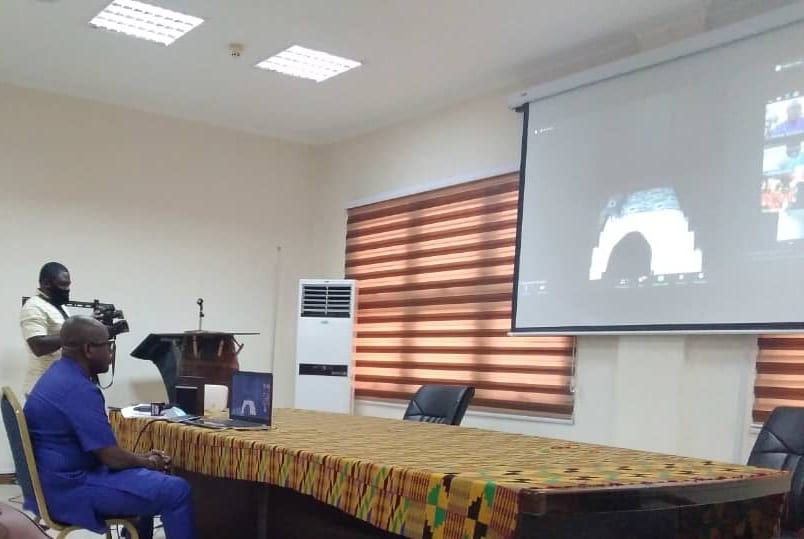
Mr. Akwasi Agyeman, CEO of the Ghana Tourism Authority, congratulated PANAFEST foundation for organizing the virtual launch, he also assured them that ‘GTA will continue to be a worthy partner for the PANAFEST festival’.
He again stated that the common thing COVID 19 pandemic has brought apart from its negative effect is the ‘resilience of African support’. “I believe moving from 2019 to 2020, there are lessons that we have learned that can be incorporated in the PANAFEST 2021 program, and the theme and activities will be a follow up of the historic ‘Year of Return, Ghana 2019’”.
PANAFEST 2021 is structured around experiences and platforms which are designed to constructively raise and examine important belligerent issues, foster healing processes, and also celebrate the strengths and resilience of African culture and achievements of Africans. The Festival is to be seen as a home and hub for creative Africans across the globe to both showcase their work and interact with each other in a meaningful way.
The PANAFEST will however feature community events that involve immersion of African-descended participants in everyday and ceremonial life.
GFA Boss Pays Courtesy Call On Ghana Tourism Authority
The President of the Ghana Football Association, Mr. Kurt Edwin-Simeon Okraku has paid a courtesy call on the CEO of the Ghana Tourism Authority, Mr Akwasi Agyeman to discuss ways of strengthening ties between their respective industries. He was accompanied by Head of Marketing, Jamil Maraby, Chief of Staff, Michael Osekre and the Deputy General Secretary, Emmanuel Newton Dasoberi.

The brief meeting was held at the headquarters of the Ghana Tourism Authority in Accra on 24th June 2020 and were received by the CEO of GTA, Mr. Akwasi Agyeman along with the Head of Corporate Affairs, Jones Nelson, the Chief Marketing Officer, Alfred Asumadu, the Manager for Projects, Development and Investments, Ben Anane Nsiah and the Deputy Chief Executive in charge of Operations, Ekow Sampson.
During the discussion, The GFA President touched on the similarities of goals that both industries have touted, that is the shared interest in bringing together Ghanaians and tourists through sports and culture. ”Football is a vehicle which drives tourism and allows for the opening up for foreign investors” he said at the meeting. He further recounted the vibrant history of football in Ghana and linked its significance to tourism and culture and mentioned how there is an apparent divide in their journey. He called for greater inclusion in the ‘Beyond the Return’ campaign wherein the sport of soccer can be used to ramp up tourism and unity among Ghanaians and outside Ghana.
Head of Marketing for the GFA, Jamil Maraby presented ideas that both organisations could use as a means to drive up interest in both sports and tourism and create new avenues for foreign exchange.
It was noted that to boost domestic and international tourism, projects like Ghana World Football Tours, Road Shows, Culturally inspired football friendly matches among others, as well as a Football Museum would be beneficial to both industries in bridging their interests.
The CEO of Ghana Tourism Authority expressed optimism in the conjoining of ideas and concepts for the positive growth of both the football and tourism industry. He further mentioned the severe impact of the ongoing global pandemic on the industry, explaining that greater interest lie within domestic tourism for now, using the See, Eat, Wear, Feel Ghana campaign. He indicated the preparedness to work with the GFA and lauded their efforts in keeping the football industry afloat during such unprecedented times.
Tourism and Football have the potential to create jobs, unite locals and visitors, as well generate revenue for the industry and nation at large.
Ghana Tourism Development Project Grant Scheme Launched
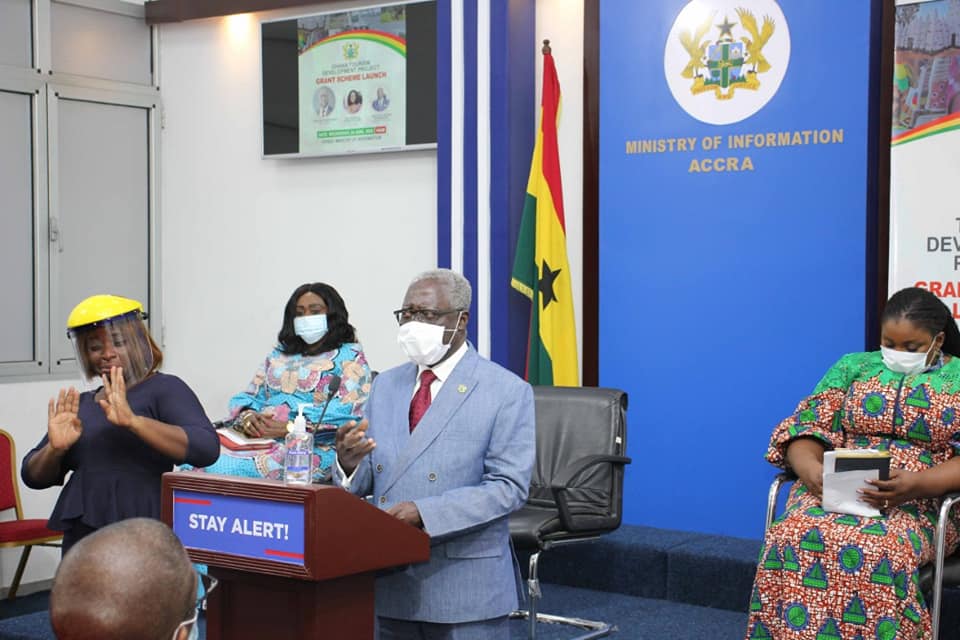
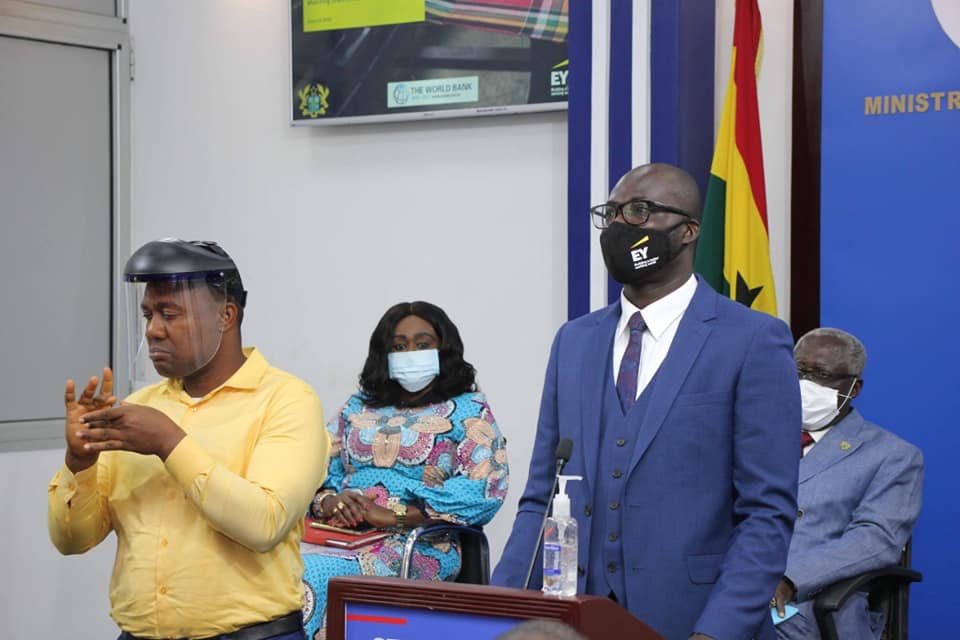
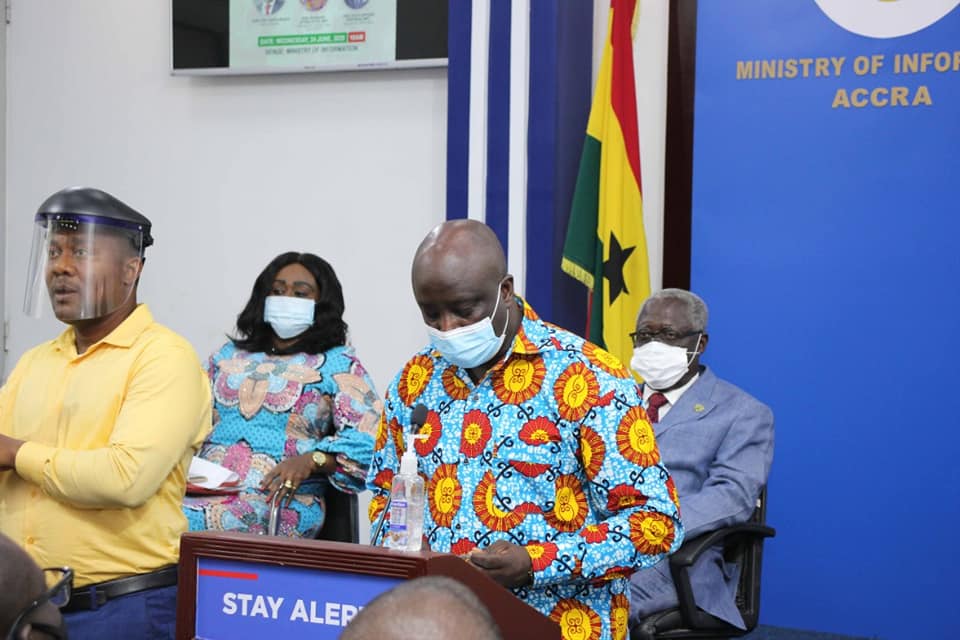
Ghana Arts & Culture Awards Opens Nominations For 2020
The Arts and Culture Company, organizers of Ghana Arts and Culture Awards has officially opened nominations for this year’s award ceremony.
The award ceremony which is aimed at acknowledging and honoring stakeholders, forerunners and key players of the Arts and Culture industry has opened nomination to the general public to nominate their favorite personality or brand. The award which started in 2019 saw government agencies and institutions showing interest due to its credibility and unique touch attached to it.
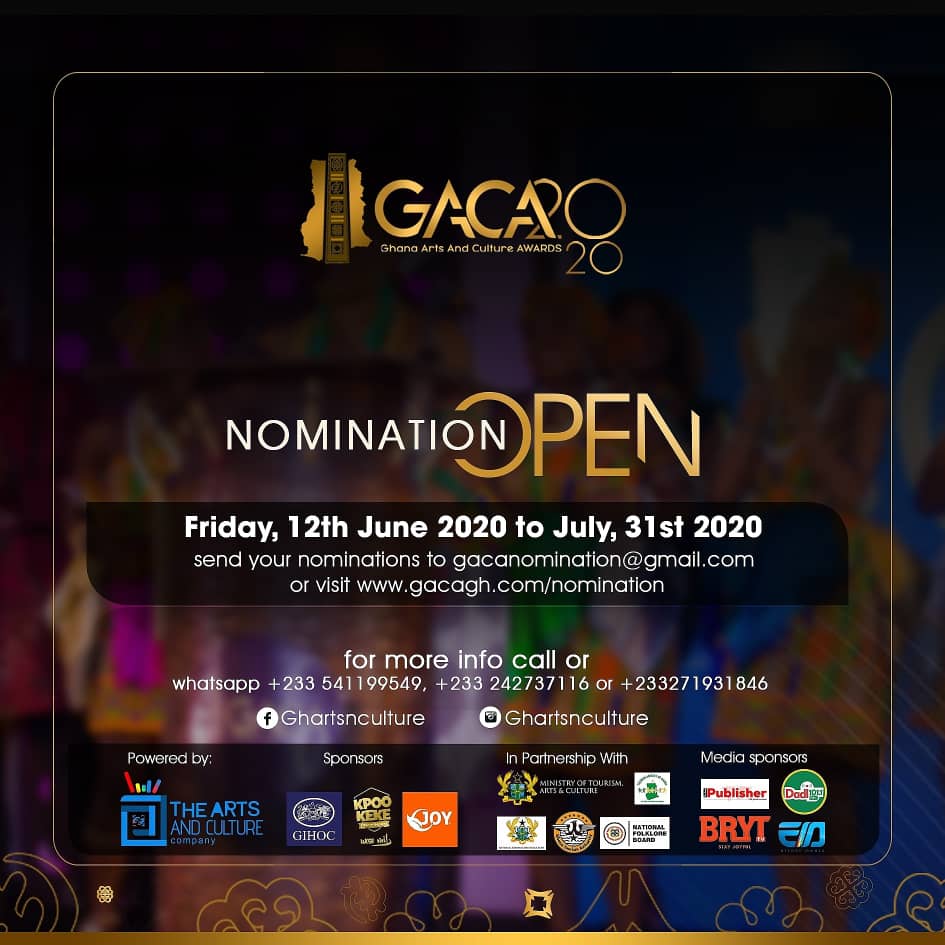
This year’s filing for nominations will be done online. Speaking to us on the rules and changes to the awards ceremony this year, Mr. Frank Saka, the Event Manager for Ghana Arts and Culture Awards said “we at the Arts and culture awards believes we are in a time where There’s been a restriction to movements and social distancing, therefore, we are urging all prospective nominees to visit our website at www.gacagh.com/nomination or send the nomination to gacanomination@gmail.com to file for nomination, adding all relevant materials which the board will need to make their final selection”.
This year’s awards ceremony will see two additional categories added to the already existing ones. The organizers said Outstanding Theatre Performance and Arts and Culture Media of the year (Radio) have been added to appreciate those in that sector promoting arts and culture in Ghana.
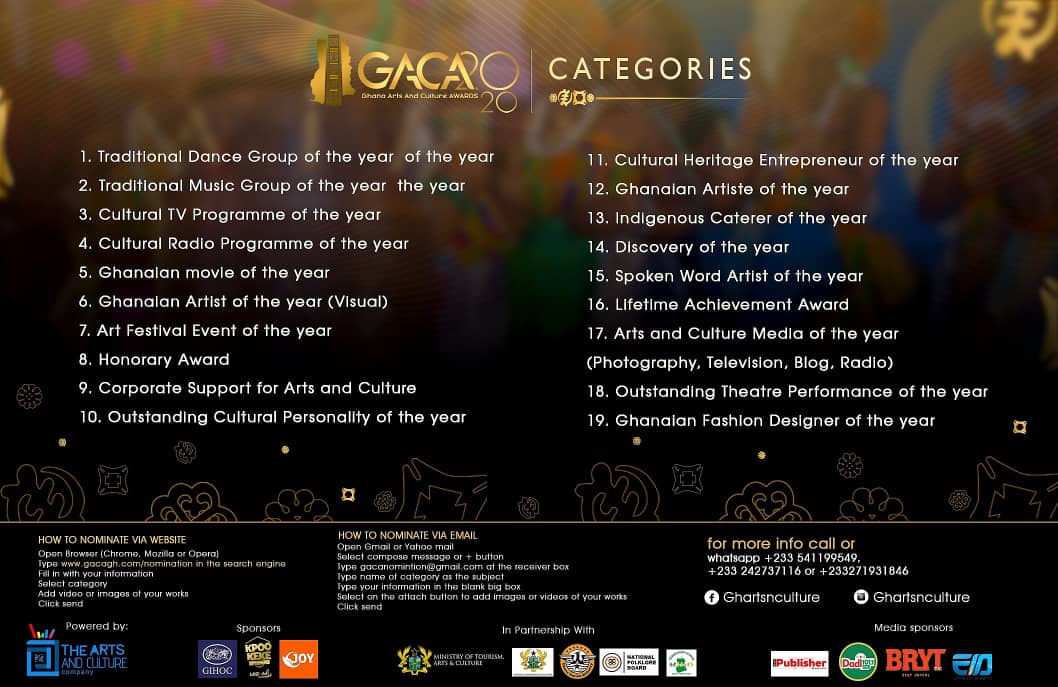
Mr. Mike Frempong the head of Communication and Research at GACA emphasized that the public has from today June 12 to July 31, 2020 to file for nomination and send all questions to the organizers by visiting the website and contacting the numbers there to be attended to. He urged the public to embrace themselves for another experience better than what took place in December 2019.
This year’s awards ceremony is in partnership with the Ministry of Tourism, Arts and Culture, Ghana Tourism Authority, National Commission on Culture, National Folklore Board, Tourism Society of Ghana and sponsored by GIHOC Distilleries Company Limited, Liberty Industry and Joy Industry. We are also being supported by The New Publisher Newspaper, Effect Media, Bryt Tv and Dadi Fm.
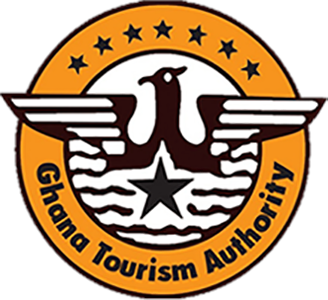

 Call Center
Call Center
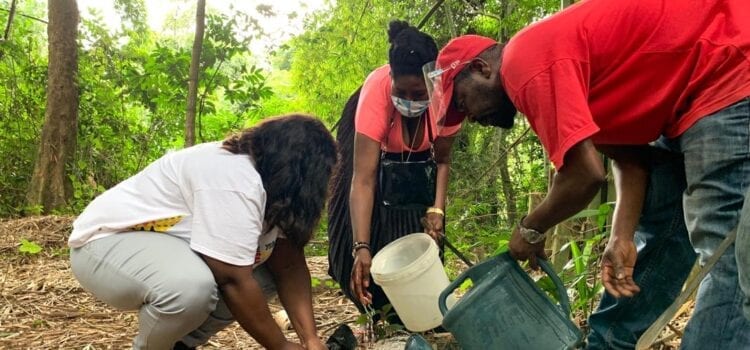
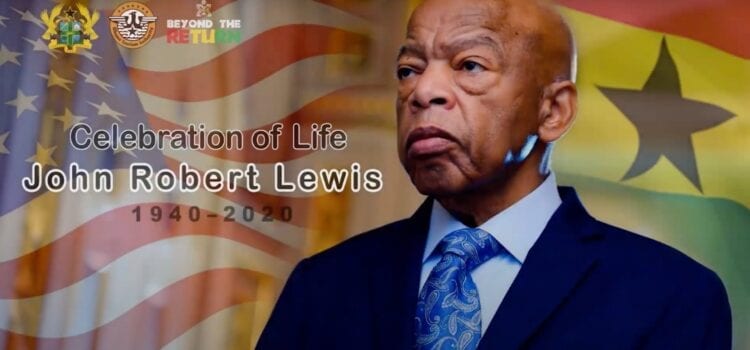
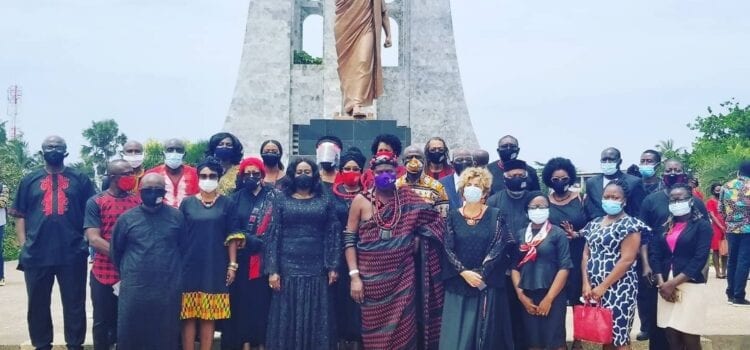
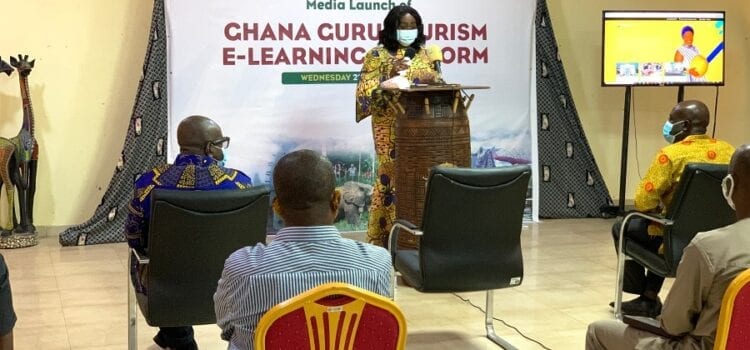
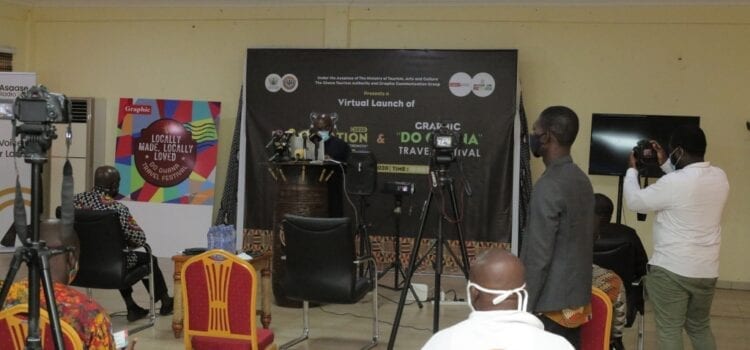
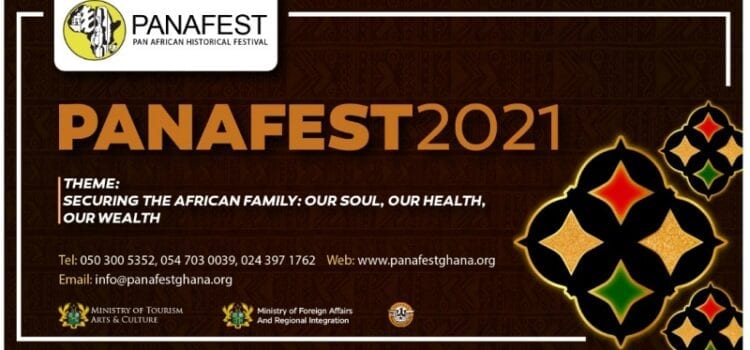
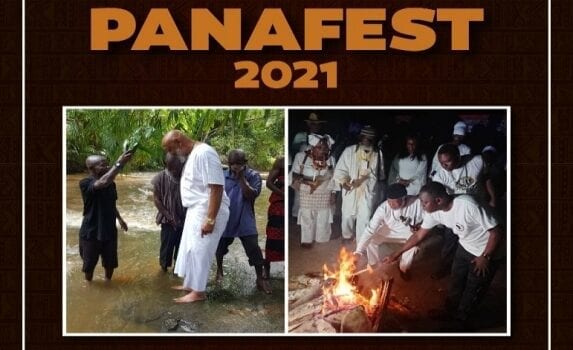

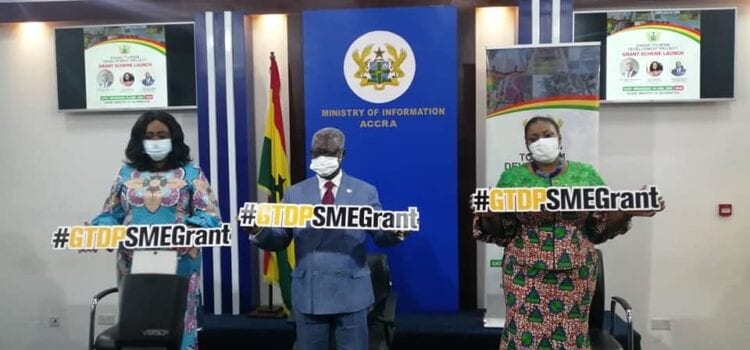

 Call Center: 0307007100
Call Center: 0307007100